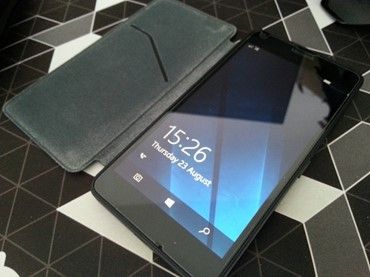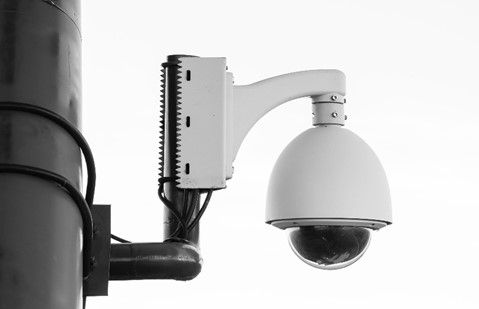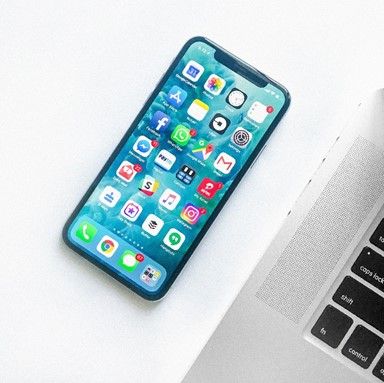insert_linkIntroduction to Windows 10 Mobile
Apple's iPhones and the endless selection of Android phones first come to mind when you think of the word "smartphone." In addition to this, you may have also heard of Windows 10 mobile—the OS for Microsoft's Lumia smartphones.
Indeed, Microsoft has had a jolly old time in regard to mobile devices—in past years.

With the introduction and widespread usage of Android and iOS, though, Microsoft and brands such as Nokia suffered; from Windows Phone 7, 8, and 8.1, to Windows 10 mobile, they never quite obtained a significant market share.
Elaborating a bit more on Windows 10 mobile—that seemed to be another attempt to claw back your interest. Windows 10 mobile, after all, was designed for an ultimate cross-device experience.
Furthermore, with the Universal Windows Platform, Microsoft really wanted to appeal to developers and consumers alike: the prospect of a single application that can run on multiple Windows platforms, with no problems?
I must say, that idea appealed to me, thus I dabbled in UWP app development for a while.
What's more, when I went to buy myself I new phone, I looked at Windows 10 mobile. But why would I do this?
In this article, I'll be outlining several reasons that pulled me into the Windows 10 mobile platform.
By the way, I'm using the Microsoft Lumia 640 (upgraded to Windows 10 mobile).
insert_linkWhy I Liked My Windows 10 Mobile Phone
insert_link1) Access to Budget, Non-Overkill Options
When considering a new phone, my priorities were as follows:
- A decent phone with which I can actually do stuff—useful stuff, to clarify.
- Something that didn't exclude a fat, stomach-punching price-tag.
In other words, I wanted a good, functional phone without re-mortgaging my house. Therefore, I wasn't exactly looking for a fancy, top-of-the-range, premium phone.
For example, Apple's range of iPhones is hilariously expensive (albeit cheaper at Amazon). As a matter of fact, if you want to get into Apple's ecosystem, be prepared to pay generously.
Me, coupled with my frugal mentality, did not want to buy anything from Apple, therefore.
Additionally, there is a rather large variety of Android phones out there—also offering budget alternatives. This was not an option, as we'll get to later.
As a result, keeping to the mainstream possibilities, Windows 10 Mobile suited my needs best.
insert_linkWhy Not a Contract, Clever Boi?

Admittedly, the upfront cost of a phone can be intimidating, hence why so many people use a contract. That is to say, paying a monthly sum of money to your phone provider for the phone until you pay it off.
While that may seem warm and cuddly at first, I disapprove of this idea—and financing in general. For you see, in the long-term, interest will add up, such that I'll actually be paying more.
Not to mention, being bound into a contract is a liability, eating away at my bank account. I use a pay-as-you-go plan, rather, as I don't feel the need to communicate frequently via text message.
Email is pretty good, or is it not? (And, of course, there are other free communication applications, too.)
insert_link2) With the Microsoft Lumia Series, You Aren't Overwhelmed with Choice
The second reason on my list is selecting the right Windows 10 Mobile device. At the time, I thought that my best bet would be to limit my options to Microsoft's series of phones.
(Maybe) Vaguely Related: No Good Resources Page Overwhelms You
After all, Microsoft is the developer of the Windows 10 Mobile operating system. As such, support for the device and software is probably going to be better.
Compare this with choosing a desktop computer—as it's extremely difficult to compare the pre-built systems. This is because manufacturers have varied cases, build quality, and support.
On top of that, the OEM hardware (such as motherboards) is more difficult to compare individually.
Therefore, either you need a comparable series of products or the ability to select each individual component.
Apple does the formative exceedingly well, with a limited selection of products. In addition, their product lines are fairly comprehensive and intuitive—you'll know what fits you best.
On the other hand, a surplus of choice and customisation—in the details—is paradoxically, equally intuitive. To demonstrate, you get to evaluate each individual component, not complete systems.
Think of it like choosing a house, and being able to control every fine detail, such as the rooms and scenery.
In reality, (most people) don't get this control, so you must compare complete, pre-existing houses. One might have the bigger bathroom, but the other has nicer scenery—which one is better?
With that in mind, I found the Microsoft Lumia product line was relatively straightforward to get my head around.
Key tip: people like organisation—they don't want to have to piece things together by themselves. Accordingly, books are still very popular, despite plenty of information being available online.
insert_link3) It's Not Android (I Hate Android)

Preceding my Windows 10 Mobile phone, I used a comparatively cheap Android smartphone. It was small, it was slow, and it was rubbish.
I don't like spending money, meanwhile, I genuinely believe in spending money (for good stuff).
To be frankly honest, I could hardly use the Android OS on that phone.
Furthermore, the way the OS is structured (in terms of settings, etc) is not intuitive for me. By contrast, the Windows 10 Mobile Settings app works similarly to the desktop; thus, I can understand it.
Plus, why do I swipe right on the home screen to find see Google's search? I despise Google!
Why You Shouldn't Use Google: What is The Best Way to Search the Internet?
Google, having made Android, deters me from the platform—even Apple knows how to do privacy! Granted, Windows 10 is infamous for collecting your data, but I seldom use my Windows 10 Mobile phone anyway.
It's the privacy of the desktop environment I care more about than anything!
As such, I've produced multiple articles on the matter.
Secure Your Desktop: Complete Privacy Guide: How to Protect Your Data
Windows 10 Mobile, interestingly, has a smokin' assortment of features making it unique in the Phone space. Namely, the iconic Windows Start Menu, which is far beyond the iPhone's home screen and Android's default launcher.
As the last point, Android is heavily modified by phone manufacturers, in many distinct ways.
The sad thing is, though, that, most of the time, these modifications make the experience worse. I've inherited a smartphone whose interface now looks worse than stock Android, thanks to the clever manufacturer.
Moreover, few places offer pure, "stock Android"—with Google's own phones being your best plan for a near-stock experience.
insert_link4) Better Integration into the Windows 10 Desktop
Another key feature of Windows 10 Mobile is its closer integration into the Windows 10 desktop.
For example, the phone would allow you to sync your data, contacts, calendar, files (via OneDrive), and more. This is all through your Microsoft account, too.
Besides that, you can receive—as they come in—and send SMS text messages from your computer. (Provided that your phone is turned on and connected to your phone network, that is.)

Altogether, these factors create what seems like one experience, not many.
Be that is it may, desktop integration is starting to fall apart now. I've come to the realisation of the privacy implications of this technology, as well.
Do you really want to trust Microsoft with all that information about you? Your precious files, SMS messages, contacts, and the like?
Right now, in fact, I'm coming around to Apple's style of doing things:
a seamlessly integrated, tightly managed ecosystem that just works.
What Desktop? Ah, This One: Ultimate Checklist for the Best Initial Windows 10 Setup 2018
insert_link5) I Rarely Make Good Use of My Phone
As I've slightly alluded to earlier, my phone doesn't get as much use as it should.
Nevertheless, there have been times in the past where I've relied on it like a warm, cuddly fragment of punctuation. ([]#')?
In truth, all my work and everything I do revolves around the desktop experience. The most use my smartphone gets is for remotely accessing my desktop computer.
Phones are primarily for communication, silly!
With that said, smartphones can be exceptionally useful for some people. But the point I'm getting across is that I don't use my phone for much at all.
In accordance with that idea, I have no need for an abundant collection of applications. The Microsoft Store, as you may know, is immensely limited in terms of the available apps you can install.
insert_linkMore on Why You Might Dislike Windows 10 Mobile
To exemplify, glance around at the bountiful software as seen in places not unlike the online. Notice how, in most cases, you see an app available on the Play Store or the App Store?
The Microsoft Store is harshly neglected by software developers—a key message having seen this. This is plausibly due to companies not having faith in the Windows 10 Mobile platform.
It's much like how Linux isn't getting the developers' support—perhaps because it's not as popular as Windows or macOS.
Related to This: Why I Abandoned Dual Boot and Finally Gained Back Freedom
As a consequence, nobody moves to Linux/Windows 10 Mobile, therefore, neither do the developers. This infinite loop can only be broken if one of the parties decide to make that leap.
Then again, of course, the leap has to be made by the party collectively; most of the developers need to invest in the platform, or the consumers make that same investment.
If one leads the way, the other follows.
insert_link6) Security Probably Exceeds that of Android
Leaving iOS out of the equation due to the sheer expense, as well as other platforms I don't care about; Windows 10 Mobile possesses surprising security benefits compared to Android.
If truth be told, this is nothing I, myself, can explain in great depth, but the message is clear.
Android is opened up to a huge extent—by several orders of magnitudes when compared with Windows 10 Mobile.
While this is a positive for a good number of people, Android's approach tickles the security fish.

It's more easily hacked by a crazy DIY-modder, hence has an increased vulnerability to hackers. Windows 10 Mobile, on the other hand, is different.
Being significantly closed off to social interaction, Windows 10 has become much of an introvert. It can't talk to the friendly neighbourhood tech gee, let alone malicious attackers.
Equally reinforcing this point is the subsequent one…
Secure Your Phone: Private Internet Access vs NordVPN? The Best Deal (Aug 2018)
insert_link7) Support Through Updates is Something I'm Satisfied With
For how long do you expect your Android device to be supported? While Apple does a splendid job of this, the same can't be said for Android as a whole.
There is an incredible quantity of Android devices, and the innumerable manufacturers vary in terms of support.
If you only have a device that is supported for, say, 1.5 years after purchase, what's the point?
When the support period ends, you see, your device will cease to receive security updates. Or rather, any sort of update at all.
In other words, once abandoned, you're stuck with a stagnant smartphone that only gets more vulnerable as each day passes.
Microsoft, however, is quite loyal to those who put faith into the Windows 10 Mobile platform.
My phone continues to receive important security updates to this day. What's more, Microsoft will continue to provide updates for Windows 10 Mobile for a while to come.
Therefore, I know my Windows Phone will be bug-free and secure for the time to come. As someone who invests in hardware for the long-term, I genuinely appreciate this attitude.
However, it's not all rose-gold.
insert_linkNow It's Dead… What Next?
Alas, since a small portion of the market actually embraced the Windows 10 Mobile platform, Microsoft was left with one choice. In their eyes, investing in the Windows Phone is not worth it.
It does not yield sufficient profit and cannot be successful—despite their best efforts.
As such, Microsoft has begun guiding Windows 10 Mobile—along the conveyor belt—into the incinerator.
While Windows 10 Phones are still receiving security updates—feature updates have come to an end.

So, if you're looking for a functional, decent, mainstream smartphone, iOS and Android are your only options. But, out of the two, which is better?
Well, if I didn't have anything better to do with my money, an iPhone is the better option. Sporting solid hardware, software, support, privacy, and stellar security characteristics, the iPhone is my recommendation.
But, for a budget, I suppose you're forced to use an Android device. Although, I am aware that Android is considerably popular among many, especially open-source proponents.
Other options include Linux distributions, such as Ubuntu. For example, projects like Ubuntu Touch and KDE Plasma Mobile look mind-blowing.
With that said, they aren't quite ready for my everyday use. Add to that the fact that these operating systems can only be installed on certain Android phones.
What do you think, having ploughed through that—Android, iOS, Windows, or another OS and why?
Is Mining Dead? (Verify Yourself): Mining Profitability 2018—Is it Easily Worth Your Time?


